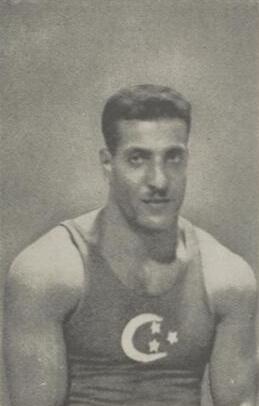1. Early Life
El-Sayed Nosseir's formative years laid the foundation for his remarkable athletic career and his eventual status as a national hero.
1.1. Birth and Background
El-Sayed Mohammed Nosseir was born on August 31, 1905, in Tanta, a prominent city in the Nile Delta region of Egypt. Information regarding his childhood and early family life is limited in detail, but his early environment in Egypt set the stage for his emergence as a notable figure in sports.
2. Weightlifting Career
Nosseir's career as a weightlifter was marked by a rapid ascent to international prominence, culminating in a historic Olympic victory.
2.1. Early Career
Although specific details about the very beginning of El-Sayed Nosseir's athletic journey are not extensively documented, he dedicated himself to the discipline of Olympic weightlifting, honing his strength and technique. His commitment soon propelled him into the national spotlight, setting the stage for his participation in the world's premier sporting event.
2.2. 1928 Summer Olympics
The pinnacle of El-Sayed Nosseir's weightlifting career came at the 1928 Summer Olympics held in Amsterdam, Netherlands. Competing in the light heavyweight class, which was for athletes weighing up to 182 lb (82.5 kg), Nosseir delivered an exceptional performance. His skill and power allowed him to dominate the competition, ultimately securing the gold medal. This triumph was particularly significant as it marked the first time an Egyptian athlete had won an Olympic gold medal, creating a moment of immense national pride and celebration back in Egypt.

2.3. World Records
During his gold medal-winning performance at the 1928 Amsterdam Olympics, El-Sayed Nosseir not only claimed victory but also established new benchmarks in the sport of weightlifting. He set a new world record in the snatch lift by successfully lifting 248 lb (112.5 kg). Furthermore, his combined total across the three lifts-the press, snatch, and clean and jerk-amounted to 783 lb (355 kg), which also constituted a new world record. These records underscored his dominance in the light heavyweight division and cemented his reputation as one of the world's strongest weightlifters of his era.
3. Later Life and Death
Following his groundbreaking athletic achievements, El-Sayed Nosseir continued to be a respected figure, eventually passing away in his home country.
3.1. Death
El-Sayed Nosseir died on November 28, 1974, in Cairo, the capital city of Egypt. His passing marked the end of an era for a pioneering figure in Egyptian sports.
4. Legacy
El-Sayed Nosseir's accomplishments left an indelible mark on Egyptian sports and contributed significantly to the nation's sense of identity and pride on the international stage.
4.1. Impact on Egyptian Sports
As Egypt's first Olympic gold medalist, El-Sayed Nosseir holds a unique and revered place in the country's history. His victory at the 1928 Amsterdam Olympics was a momentous event that transpired the realm of sports, instilling a profound sense of national pride and demonstrating Egypt's potential on the global athletic stage. His achievement served as an immense source of inspiration for future generations of Egyptian athletes, encouraging participation in various sports and fostering a culture of athletic excellence. Nosseir's legacy continues to be celebrated as a symbol of Egyptian determination and success in international competition.